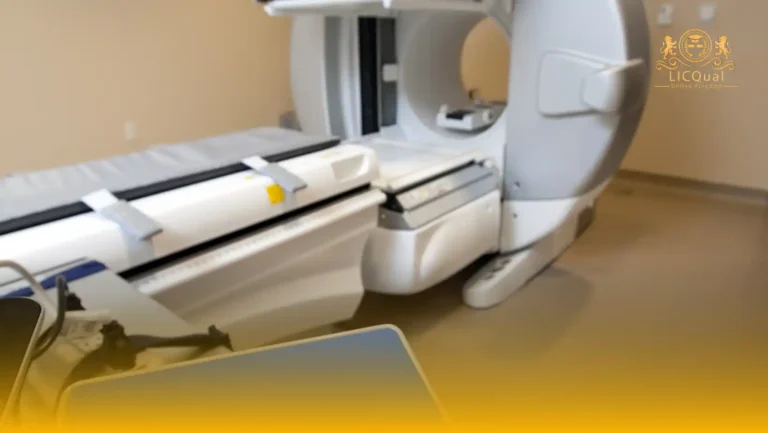The LICQual Level 7 Postgraduate Diploma in Infectious Diseases (PgDID) is a highly specialised qualification designed for healthcare professionals who wish to enhance their expertise in the diagnosis, treatment, and prevention of infectious diseases. This advanced programme is not intended for fresh candidates, but for experienced practitioners seeking to strengthen their professional competence, expand their knowledge, and increase their Continuing Professional Development (CPD) in line with international healthcare standards.
Infectious diseases remain one of the most significant challenges in modern medicine, requiring skilled professionals who can apply evidence-based practices to manage and control outbreaks effectively. This postgraduate diploma provides learners with a deep understanding of epidemiology, advanced diagnostic methods, antimicrobial stewardship, infection prevention, and global health strategies. By engaging with this qualification, learners will be better prepared to take on leadership roles in clinical practice, research, and public health.
Centres delivering the PgD in Infectious Diseases must ensure the highest standards of teaching and support. This includes employing competent and qualified staff with relevant expertise, as well as providing learners with access to up-to-date study materials, case studies, clinical resources, and digital learning tools. A strong commitment to academic quality and practical training is essential to ensure learner success and effective application of knowledge in real-world healthcare settings.
By completing this programme, learners will gain advanced specialist skills that enhance career prospects while contributing to the improvement of healthcare outcomes worldwide.
Course Overview
Qualification Title
LICQual Level 7 Postgraduate Diploma in Infectious Diseases (PgDID)
Total Units
6
Total Credits
120
GLH
600
Qualification #
LICQ2200963
Qualification Specification
To enroll in the LICQual Level 7 Postgraduate Diploma in Infectious Diseases (PgDID), applicants must meet the following criteria:
|
Qualification# |
Unit Title |
Credits |
GLH |
|---|---|---|---|
|
LICQ2200963-1 |
Advanced Principles of Infectious Diseases |
20 |
100 |
|
LICQ2200963-2 |
Clinical Microbiology and Pathogen Biology |
20 |
100 |
|
LICQ2200963-3 |
Epidemiology and Control of Infectious Diseases |
20 |
100 |
|
LICQ2200963-4 |
Diagnosis, Treatment, and Prevention of Emerging Infections |
20 |
100 |
|
LICQ2200963-5 |
Global Health, Policy, and Infectious Disease Management |
20 |
100 |
|
LICQ2200963-6 |
Research Methods and Evidence-Based Practice in Infectious Diseases |
20 |
100 |
By the end of this course, learners will be able to:
Unit 1: Advanced Principles of Infectious Diseases
- Critically analyse the pathophysiology and transmission mechanisms of infectious diseases.
- Evaluate host immune responses and their role in disease progression and recovery.
- Assess the impact of environmental, social, and biological factors on infectious disease outcomes.
- Apply advanced knowledge of infectious diseases to complex clinical and public health contexts.
Unit 2: Clinical Microbiology and Pathogen Biology
- Demonstrate advanced understanding of bacterial, viral, fungal, and parasitic pathogens relevant to human health.
- Evaluate laboratory diagnostic methods for the identification of infectious agents.
- Critically assess pathogen resistance mechanisms and their implications for treatment.
- Integrate microbiological knowledge into evidence-based clinical decision-making.
Unit 3: Epidemiology and Control of Infectious Diseases
- Analyse epidemiological data to identify patterns, trends, and determinants of infectious diseases.
- Critically evaluate outbreak investigation methods and apply appropriate control measures.
- Examine the role of vaccination programmes and antimicrobial stewardship in disease prevention.
- Develop strategies for effective infection prevention and control within healthcare and community settings.
Unit 4: Diagnosis, Treatment, and Prevention of Emerging Infections
- Assess the challenges and complexities of diagnosing emerging and re-emerging infections.
- Evaluate current and novel treatment strategies for emerging infectious diseases.
- Critically appraise global strategies for the prevention of infectious disease outbreaks.
- Apply advanced knowledge to the development of effective preparedness and response plans.
Unit 5: Global Health, Policy, and Infectious Disease Management
- Analyse the global burden of infectious diseases and their impact on public health systems.
- Critically evaluate international health policies and regulations related to infectious disease control.
- Assess the role of health organisations and stakeholders in managing infectious disease threats.
- Apply principles of policy development and implementation to improve global infectious disease outcomes.
Unit 6: Research Methods and Evidence-Based Practice in Infectious Diseases
- Demonstrate advanced skills in designing, conducting, and evaluating research in infectious diseases.
- Critically appraise published research using appropriate methodological frameworks.
- Apply statistical and analytical methods to interpret complex data in infectious disease research.
- Integrate evidence-based practice into clinical and public health decision-making.
The LICQual Level 7 Postgraduate Diploma in Infectious Diseases (PgDID) is designed for both experienced healthcare professionals and beginners who want to build a career in infection control, epidemiology, and global health. This internationally recognized Level 7 Infectious Diseases qualification provides CPD accredited training, practical skills, and evidence-based knowledge. Whether you are a doctor, nurse, epidemiologist, or a career changer entering healthcare, this program equips you with the expertise to deliver safe and effective infectious disease management.
1. Medical Doctors and Physicians
- Strengthen expertise in diagnosing and managing complex infectious diseases
- Gain CPD accredited postgraduate training in infection control and epidemiology
- Expand practice offerings with advanced infectious disease services
- Build authority with an internationally recognized Level 7 qualification
- Meet patient demand for evidence-based infectious disease treatments
2. Nurses and Mid-Level Practitioners
- Transition into infectious diseases with structured postgraduate training
- Learn advanced diagnostic and patient management techniques
- Increase career opportunities in hospitals, clinics, and global health programs
- Develop confidence in delivering safe and effective infection control practices
- Earn a globally recognized diploma to enhance professional credibility
3. Epidemiologists and Public Health Specialists
- Diversify expertise by adding infectious disease specialization
- Master outbreak investigation and global health surveillance strategies
- Attract new opportunities in research, policy, and international health organizations
- Gain CPD accredited certification for career advancement
- Position yourself as a trusted provider in infectious disease prevention and control
4. Beginners Entering Healthcare
- Start a career in infectious diseases with guided, step-by-step modules
- Learn core skills in patient assessment, diagnosis, and treatment planning
- Access internationally accredited postgraduate training without prior specialization
- Build a strong foundation for future advanced qualifications
- Join one of the best postgraduate infectious diseases courses UK for beginners
5. Career Changers
- Transition into healthcare and infectious diseases from other industries
- Acquire practical skills in infection control and global health management
- Gain global recognition with a Level 7 postgraduate diploma
- Explore new opportunities in hospitals, clinics, and public health organizations
- Build a rewarding career in a fast-growing medical specialty
6. International Healthcare Professionals
- Earn a qualification recognized across global healthcare systems
- Access CPD accredited training aligned with international standards
- Strengthen career prospects in infectious diseases worldwide
- Learn evidence-based techniques for safe patient care
- Expand practice opportunities in both local and international markets
7. Professionals Seeking Academic and Career Growth
- Advance knowledge with evidence-based postgraduate infectious diseases training
- Strengthen EEAT compliance with authoritative certification
- Gain expertise in epidemiology and infection control for career progression
- Build credibility with patients, employers, and academic institutions
- Position yourself as a leader in infectious disease education and clinical practice
Centres intending to deliver the LICQual Level 7 Postgraduate Diploma in Infectious Diseases (PgDID) must ensure that the highest academic and professional standards are maintained. To guarantee quality training and learner success, centres are required to meet the following essential requirements:
- Qualified Academic Staff – Centres must employ experienced and highly qualified professionals with expertise in infectious diseases, public health, and related medical disciplines. Tutors should possess postgraduate qualifications and strong industry experience.
- Comprehensive Learning Resources – Centres should provide up-to-date teaching materials, textbooks, digital learning platforms, and access to current research publications to support advanced learning.
- Clinical and Laboratory Facilities – Where applicable, centres must provide access to clinical environments, laboratory facilities, or virtual simulation tools to enable practical understanding of infectious disease diagnosis and management.
- Robust Assessment Systems – Centres must establish reliable assessment procedures aligned with international academic standards, ensuring fairness, transparency, and effective learner evaluation.
- Learner Support Services – Adequate academic guidance, mentoring, counselling, and technical support must be available to assist learners throughout their studies.
- Commitment to CPD and Research – Centres must actively promote continuous professional development and provide opportunities for learners to engage in research and evidence-based practices.
- Compliance with Quality Assurance Standards – All delivery centres must meet LICQual quality assurance frameworks, ensuring consistency, credibility, and academic excellence in programme delivery.
Assessment and Verification
All units within this qualification are subject to internal assessment by the approved centre and external verification by LICQual. The qualification follows a criterion-referenced assessment approach, ensuring that learners meet all specified learning outcomes.
To achieve a ‘Pass’ in any unit, learners must provide valid, sufficient, and authentic evidence demonstrating their attainment of all learning outcomes and compliance with the prescribed assessment criteria. The Assessor is responsible for evaluating the evidence and determining whether the learner has successfully met the required standards.
Assessors must maintain a clear and comprehensive audit trail, documenting the basis for their assessment decisions to ensure transparency, consistency, and compliance with quality assurance requirements.







